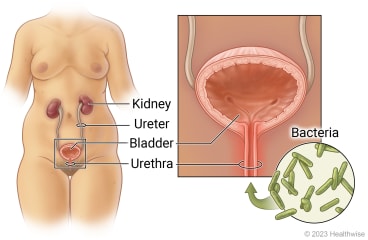
Overview
A urinary tract infection (UTI) is an infection caused by bacteria. It can happen anywhere in the urinary tract. A UTI can happen in the:
- Kidneys.
- Ureters, the tubes that connect the kidneys to the bladder.
- Bladder.
- Urethra, where the urine comes out.
Most UTIs are bladder infections. They often cause pain or burning when you urinate.
Most UTIs can be cured with antibiotics. If you are prescribed antibiotics, be sure to complete your treatment so that the infection does not get worse.
Follow-up care is a key part of your treatment and safety. Be sure to make and go to all appointments, and call your doctor if you are having problems. It's also a good idea to know your test results and keep a list of the medicines you take.
How can you care for yourself at home?
- Take your antibiotics as directed. Do not stop taking them just because you feel better. You need to take the full course of antibiotics.
- Drink extra water and other fluids for the next day or two. This will help make the urine less concentrated and help wash out the bacteria that are causing the infection. (If you have kidney, heart, or liver disease and have to limit fluids, talk with your doctor before you increase the amount of fluids you drink.)
- Avoid drinks that are carbonated or have caffeine. They can irritate the bladder.
- Urinate often. Try to empty your bladder each time.
- To relieve pain, take a hot bath or lay a heating pad set on low over your lower belly or genital area. Never go to sleep with a heating pad in place.
To prevent UTIs
- Drink plenty of water each day. This helps you urinate often, which clears bacteria from your system. (If you have kidney, heart, or liver disease and have to limit fluids, talk with your doctor before you increase the amount of fluids you drink.)
- Urinate when you need to.
- If you are sexually active, urinate right after you have sex.
- Change sanitary pads often.
- Avoid douches, bubble baths, feminine hygiene sprays, and other feminine hygiene products that have deodorants.
- After going to the bathroom, wipe from front to back.
When should you call for help?
Call your doctor now or seek immediate medical care if:
- You have new or worse fever, chills, nausea, or vomiting.
- You have new pain in your back just below your rib cage. This is called flank pain.
- There is new blood or pus in your urine.
- You have any problems with your antibiotic medicine.
Watch closely for changes in your health, and be sure to contact your doctor if:
- You are not getting better after taking an antibiotic for 2 days.
- Your symptoms go away but then come back.
Where can you learn more?
Go to http://www.healthwise.net/patientEd
Enter K848 in the search box to learn more about "Urinary Tract Infection (UTI) in Women: Care Instructions".
Current as of: April 30, 2024
Author: Ignite Healthwise, LLC Staff
Clinical Review Board
All Healthwise education is reviewed by a team that includes physicians, nurses, advanced practitioners, registered dieticians, and other healthcare professionals.

